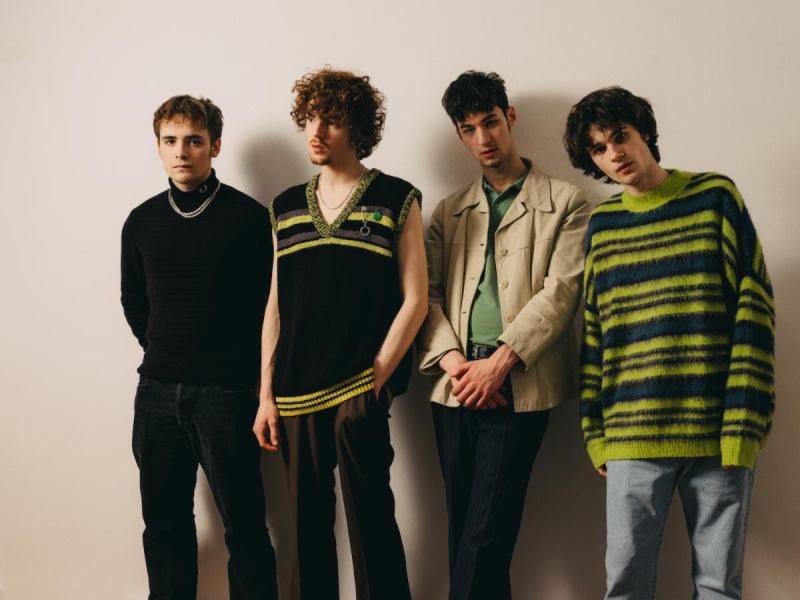
The Lounge Society by Alex Evans
The Lounge Society’s debut album Tired Of Liberty is released on August 26th.
Life comes at you pretty fast. Even faster when you’re in a young band, riding the crest of a wave of festival dates during the busiest summer for three years, with a red hot debut album burning a hole in your back pocket.
A few years ago, The Lounge Society were hatching plans to take over the world and be at the level of bands like The Strokes. Little did they know that they’d ‘soon’ be on the same bill, as the Hebden Bridge gang recently found themselves.
“It was amazing,” says guitarist Hani Paskin-Hussain of their slot at the recent Lytham Festival during an exclusive interview with Live4ever.
“Playing with The Strokes, Fontaines D.C. and Wet Leg…We kept joking and saying that we were playing with the hottest bands in the world. It was insane that we were on that bill.”
“We had a great time and it was nice hanging out with those bands. Well, Fontaines and Wet Leg, we didn’t really see The Strokes! They were in their own little area, which was fair enough. The other bands were really sound.”
Yet it must have been odd to see their heroes up close and personal, observing their rituals and behaviours pre-gig, with a view that many will never have?
“I found it quite reassuring, because when you see a band like Fontaines D.C. or The Strokes go onstage, they sort of seem above human,” fellow guitarist Herbie May explains.
“They know what they’re doing, they do it incredibly well and most of the human population knows about it and loves it. But when you get to see them warming up and stretching, and maybe looking a little bit nervous before they go on, it’s quite reassuring. It is attainable, that level of slickness or whatever.”
“You don’t have to be born a Bowie. Everyone is the same until they get on stage, which was nice. Obviously, you do take in little things from the performances of bands like that, but really, I think it’s great to see that these people aren’t that different from us. Which is more inspiring in a way, because if they were superhuman then there wouldn’t be much for us to work at.”
And work The Lounge Society do. Being on the same bill as the most influential band of this century was likely a million miles from their thoughts when the gang of four met as teenagers.
“We met in high school, but we kind of knew each other already,” Paskin-Hussain tells us, “We played football a bit and through different lessons, but we met in music, we all did Music GCSE. It sounds a bit cliched, but we bonded over guitar music initially, and then we talked about other types of music. Bands like The Strokes and The Smiths, all those kinds of bands.”
Skipping ahead slightly, The Lounge Society have found their natural home on the now pretty-much-legendary independent label Speedy Wunderground. May picks up the tale and explains how they came to the attention of label head and producer Dan Carey- a man who can count Foals, Kae Tempest and Bloc Party amongst his credits.
“We fired a very random shot-in-the-dark email of a demo that we’d recorded at Airtight Studios in Manchester. I think it was one of our first songs that we ended up doing.”
“We just sent it over, not really expecting very much because we found out later that they get hundreds of demos a week, and probably still do. Somehow Dan’s management heard it and sent it to him.”
“He liked it and then we got the email back, and that was that. I remember the jubilation. Until then we wanted to be Oasis, but in actual fact we were playing open mic nights. Then suddenly, there was a route!”
The sessions were a success, with debut single (and Live4ever’s Track Of 2020) Generation Game the result. Everything was in place for a full-blooded campaign that year, but then…you know where this is heading. “It came out pretty much the same week as the first lockdown,” May confirms.

Yet this huge derailing of any momentum did little to knock the foursome’s determination, as Paskin-Hussain explains: “It was stressful, like it was for everyone, but we were so set on trying to keep doing what we were doing.”
“We had this really exciting period and then everything hit, but we got set on writing songs in our separate homes or together, when it was allowed, and getting straight back to it as soon as possible. I think that strive was pretty important, but otherwise it was a dark time.”
“We all had a shared belief that we weren’t just having a play around and seeing what we wanted to do,” drummer Archie Dewis adds. “We were pretty certain and we wanted to hit the levels of The Strokes.”
We are a pretty ambitious band and, hopefully not in an arrogant way, we truly believe we’ve got the power to do something big and not let something like that stop us from doing it.
Two years on, and that determination is paying off, with debut album Tired Of Liberty now in the can and ready to be unleashed at the end of August.
Carey has overseen the group’s career from that point to this, acting as producer for the album. “The atmosphere that the studio itself brings, and with Dan as a manager of the studio, is inspiring inherently.”
“You can’t really walk into that room without something leaping out at you. And, obviously, if you’re going in to record an album you bring a lot of ideas with you.”
“I think it’s a nice cooking pot of ideas being chucked around. Dan would suggest things here and there but only as a suggestion, not a matter of course because I think he’s respectful of it being our piece of art. He knows how to make it how it should be.”
“For us, working with Dan is a necessity at this point. We’ve developed symbiotic communication in the studio, where things get done and ideas come together. Someone will start doing something in one corner of the room and it will be completed in one corner by another person. The whole thing works like a machine.”
“Dan and Alexis (studio engineer) have that on a ridiculous level, they can read each other’s minds. They barely even need to talk when in the studio, everything just gets made perfect. It’s epic to watch. That slickness was really beneficial for the album, and I think you can hear it underneath the songs.”
Yet the album wouldn’t be what it is had the pandemic not happened, with the lockdowns and their effects partially influencing its contents. “The themes of lockdown, or at least what that does to your mentality, inevitably feed into the record,” May explains.
“To deny that would be a fashionable choice and not true, but I think (album track) Boredom Is A Drug specifically has more to it. It’s about small-town life. Where we live, it can feel like you’re in lockdown, in a sense. In a group of six, everyone knows everyone. Probably seeing what happened to our town during lockdown fed into those lyrics.”
“But it’s maybe a little more general than that. Life in a small town is so insular there seems to be very little way out so people get messed up all the time as a result.”
“On paper it’s one of the most idyllic places in the country. We couldn’t pretend that it was something that you necessarily need to escape from. I think that would be wrong.”
“The valley shape means it’s harder to climb out of the hole. For us, it’s more about escaping from the mentality of what feeling stuck does to you rather than escaping Hebden Bridge, which is actually great. But it does have some unique problems as a result of being a bit special, it does result in people losing it a little bit.”
“Boredom results in drugs, and vice versa. It’s not just about Hebden Bridge, it’s an album which attempts to deal with the feelings of being stuck, or liberty, as cringe as a segue way as that is!”
The desire to escape one’s surroundings has constantly been a source of inspiration for artists in the past, with The Lounge Society being products of the latest generation to aspire to better, or simply different, things.
As Paskin-Hussain puts it, it’s a worldwide feeling: “When it comes to Hebden, there was definitely a lot of lyrics written about watching other people in the town, which is quite a weird feeling for us.”
“Having friends, being in a band and being able to spend time in London and potentially move out…then also seeing some of your best mates stuck in the town, or people dying who you know.”
All teenagers or young adults have that feeling, unless you’re brought up somewhere like Chelsea! That feeling of wanting to get out. I’m sure, and I hope, that there are people who listen to the album who can relate to that feeling. I’m sure there will be.
Unfortunately, ‘getting out’ isn’t as easy as once it was. Over the summer, countless bands have commented upon the difficulties that Brexit has imposed upon them, with visas and carnets (a declaration of the equipment) now required.
The Lounge Society are no different, and encountered such issues themselves upon their return to the UK after a European festival, as May explains:
“The carnet was not stamped ‘into England’ the last time we came into England. So all our gear was considered ‘in France’ and we were trying to get into France, so obviously that didn’t make sense. Then we had some trouble finding the queues….so basically Brexit but also a lack of organisation. It is what it is.”
With little choice but to play this new game, the band are philosophical about the new travails, as May continues: “I guess it will just take getting used to the smoothest ways around it. Once you get into the rhythm you’ll know the ins and outs, such as where the carnet office is in Calais, which would have been useful!”
“It’s just getting worse and worse, but there’s not much you can really do about it,” Dewis continues. “Not specifically us, but you’re pitted against bands trying to get out there, and people in general, trying to connect with Europe.”
“It’s going to be harder for bands from Europe to come over here as well, which is a great shame because we’re missing out on a lot of other culture. We’ve just got to try and do the best we can within the rules that are set and try and make it work.”
“It’s so expensive to get over there as well,” says Paskin-Hussain. “We’re lucky in that, predominantly, European festivals pay really well and feed and water you, which is amazing. Better than they do in England.”
“We were hearing whispers of how much things were costing, like van hires, ferries, all these things add up. I guess it’s the same for all bands at our level.”
Not that it will deter the group, with further European dates on their itinerary for the autumn. “We love playing in Europe. I know we’ve just been complaining about how stressful it was, but we always have an amazing time.”
“The way we’re treated over there is really nice. You always get surrounded by really nice people which is great, and meeting other bands. It’s a good opportunity for that.”

Although some earlier singles, such as Burn The Heather, didn’t make the cut for the new album, Generation Game stands firm with a new version closing proceedings.
It’s clear when speaking to the group that the song is a special one for them, and always will be. “More than anything there’s a nice full circle moment with that being the first thing we ever did and now the last thing for this period of time,” states Dewis.
“It definitely won’t be the last thing we ever do, but it rounds this period off nicely. We’ve gone on so many tours now and done so much more than that first single…we approached it in the same way as if we’d written it today. It’s definitely got a different feel to it, which will be interesting for people to hear.”
“That song definitely developed in our shows a lot, probably more than anything else,” claims Paskin-Hussain. “Tracks like Burn The Heather or Cain’s Heresy we still play, but they’ve been more like they sound on record.”
“Generation Game has always had its own bizarre live character. The original single has that live feeling, but the album version really has it. It would have felt a bit lazy just to stick the single version on, that wouldn’t have worked.”
“If we were going to have it on it had to be re-recorded, and I’m glad we did. The single is quite an important thing for us and had its own place in our heart, but this version is more true to where we are now.”
Lyrically, the track takes to task the current state of contemporary politics, but Paskin-Hussain clarifies that the original intention was a bit more specific. “It was a strange one.”
“Really it was written about what’s happening in China with the Uyghurs and the fucked-up stuff that’s going on there, but then it took its own thing and the pandemic happened. Obviously, there’s the Brexit element of it, but it really is about the stuff that’s going on in China.”
“We, especially at the age we were when we wrote it, would never claim to be political philosophers of any description,” May clarifies. “Most people aren’t.”
“Really it’s just a verbal and musical lashing out at elites. I don’t think it could be any more than that. We’re not talking about geopolitical powers, but just the frustration of seeing people who need help and the priorities of those who have the power to give it. It’s just an expression of despair.”
Despite their protestations, The Lounge Society clearly have political opinions, including this succinct analysis of the current Tory leadership contest:
“Whoever has put this comedy show together is a fucking genius,” May exclaims. ‘It’s not really a joke, because it’s going to end up in a complete mess. I have very little to say other than that I feel sorry for everyone I see.”
“At the moment there is literally nothing that any of us can do apart from the members of the Tory party. And we trust them – the world’s most pathetic power vacuum.”
And their opinions aren’t just confined to politics. The label ‘post-punk’ is one that’s been forced upon the group in some quarters, and it’s not one they are entirely happy with.
“It’s important to make clear that we don’t have anything against the post-punk movement, or any bands, it’s more like a question of: What is it?,” posits Paskin-Hussain. “It’s lazy journalism and most post-punk bands aren’t post-punk. It feels reductive.”
“It’s not so much insulting, but being on Speedy Wunderground and being associated with these South London bands, a lot of whom we have respect for. I don’t think we want to be thrown in with that.”
We know we’re connected, but we’d rather be Fontaines D.C., or The Strokes, or Oasis. I know it sounds over-the-top, but we’re quite serious about that. We don’t want to be another Windmill band. Again, great venue, nothing against it, but we want to be an arena band.
“My opinion is that it’s a bad move for a band to have an identity in that way,” states May, diplomatically. “It’s a self-fulfilling prophecy. If you say you’re going to be a post-punk band then that’s what you’ll be.”
“Musicians aren’t supposed to be limited to the Spotify era choosing of genres. It’s pointlessly restrictive. We’re a band, and that shouldn’t be narrowed down. That will make your career very short and probably quite boring.”
“If we decide we’re a jazz band, we can do that for a bit. And if it doesn’t work out, we’ll be a rock band. We can change from song to song, we may not even use those labels at all.”
“Also, who are we to tell people what we sound like it? If they want to call it post-punk then fine, but we would never do that. It’s up to other people to interpret, and that’s why we sell it to them and not the other way around.”
And in four words, May sums up a healthy philosophy which should, if there’s any justice in the world, stand The Lounge Society in very good stead:
“It belongs to the listeners.”



